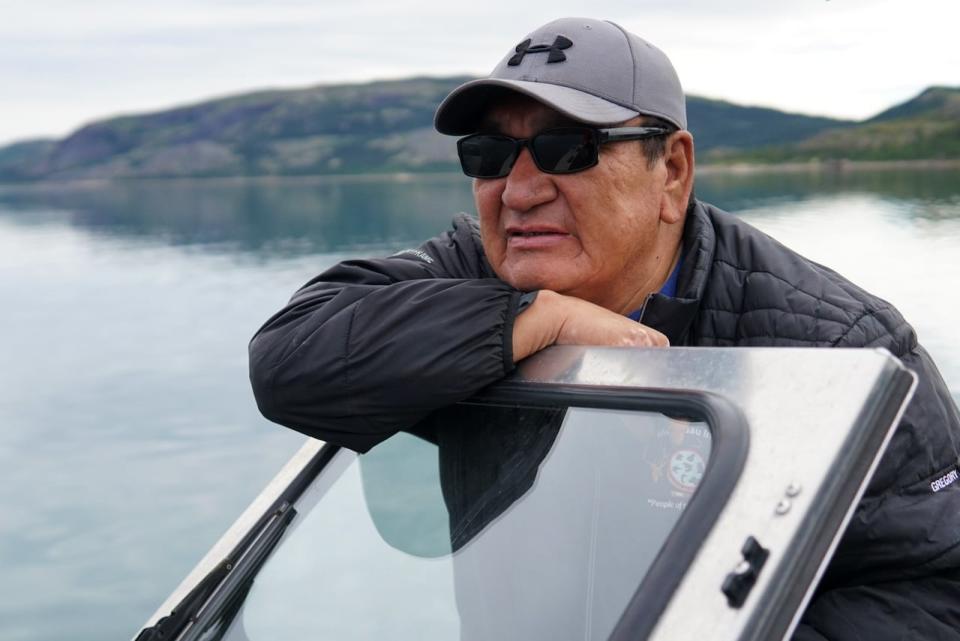Innu Grand Chief hopes day school class-action case will be settled out of court


Innu Nation Grand Chief Simon Pokue hopes the case can be settled quickly for aging survivors. (CBC)
For Simon Pokue, Grand Chief of the Innu Nation, the goals of a new class-action lawsuit against the federal and provincial governments are clear.
"This case is being launched because of the abuse and the harm that our people suffered in day schools and it needs to be acknowledged," Pokue said. "This really also damaged the Innu culture, especially our language."
"We want Canada and the province to acknowledge this harm."
The Innu Nation launched the class-action against the governments of Newfoundland and Labrador and of Canada on Thursday, seeking compensation for Indigenous day school survivors in Sheshatshiu, Natuashish and the former community of Davis Inlet.
The lawsuit alleges that children suffered physical, sexual, emotional and cultural abuse while at the schools. The day schools were funded by the Canadian government and overseen by the province from 1949 until 2009, when the Innu took control over their own education system.
While separate from the residential school system, day schools were also part of a federal policy aimed at assimilating Indigenous children. Ottawa signed a similar $1.47-billion settlement with thousands of former day school students in 2019, but the Innu were not included because they did not come under the Indian Act until the early 2000's.
Grand Chief calls for 'fair treatment'
Pokue said the Innu want "fair treatment."
"In comparison, other First Nations suffered the same harm and received some compensation for that harm. Our experience has not been recognized, our people deserve the same kind of recognition."
Though the lawsuit has not yet been certified, Pokue is hopeful that the case will be resolved quickly.
"We don't want to go to the courts, that's time consuming and it costs money," he said.
"I hope Canada and the province can work with us.… We want this case to be settled whether we will be out of court or in court."

The Innu's class action lawsuit against the province and the country has not yet been certified. (CBC)
Pokue said the focus is on the survivors.
"We want to move ahead with justice for survivors," he said. "Most of the survivors are now deceased."
But Pokue said the survivors' stories live on.
"Most of the survivors have talked to the inquiry that that was done and related their stories and their experiences."
Gregory Rich, former chief of the Innu Nation, is a day school survivor and a plaintiff on the case.
He says the memories of abuse he witnessed in school stick with him to this day.
"I witnessed a lot of this abuse happening with my classmates and other students as well," RIch said.
"When I see my classmate being beaten up by a teacher it really affects me. It gives you questions. 'Is this part of the school process that's happening?' And it's psychological abuse as well."

Former Innu Grand Chief Gregory Rich says he has clear memories of the abuse he witnessed in day school. (Ariana Kelland/CBC)
Rich said the experience of day school survivors mirrors the experience of those in residential schools.
"If you listen to residential school survivors, their stories are very similar to day schools," he said. "The trauma is the same, the abuse is the same … and the hurt is still the same."
"The consequences of that abuse is the same all across Canada."
Rich believes other problems in Innu communities stem from day school experiences.
"The Canadian public need to know these things were happening in Labrador and in the Innu communities," Rich said. "We were excluded in the residential school settlements and also the day school settlements across Canada."
While Prime Minister Justin Trudeau apologized to the Innu Nation's residential school survivors in 2017, the nation rejected that apology as it didn't include day school survivors. Rich said an apology isn't enough.
"The Innu Nation rejected it because these things were still happening and there's nothing in place to help the victims of abuse at the schools. There's no support programs and a lack of funding."
Download our free CBC News app to sign up for push alerts for CBC Newfoundland and Labrador. Click here to visit our landing page.


